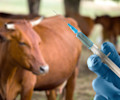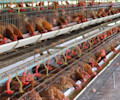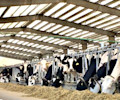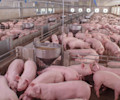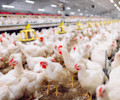Investor coalition demands corporate action on systemic overuse of antibiotics – FAIRR
* 10 of largest food companies in US & UK targeted
* Investors warn of risks both to human health and financial returns
(11 April, London) – A $1 trillion coalition of 54 institutional investors, including Aviva Investors, Natixis Asset Management, ACTIAM, Mirova, Coller Capital and Strathclyde Pension Fund, has launched an engagement campaign with ten of the biggest US and UK restaurant chains, to call for an end to non-therapeutic use of antibiotics important to human health in their global meat and poultry supply chains.
The companies include J D Wetherspoon, McDonald’s and Domino’s Pizza Group, which holds its AGM later this month (20 April). The coalition has been brought together by the Farm Animal Investment Risk & Return (FAIRR) Initiative and responsible investment charity ShareAction, with the support of US investor group ICCR and US non-profit As You Sow.
The investors are responding to warnings from the World Health Organization (WHO) that irresponsible antibiotics practices are leading the world towards a ”˜_post-antibiotic era’_ where routine operations will no longer be possible and many infections no longer treatable. Around half of all antibiotics produced in the UK are given to livestock, with the figure rising to 80% in the US; a practice the UK government recently described as ”˜excessive and inappropriate’ in a paper which found that drug-resistant infections could cost the world around $100trillion in lost output by 2050.[1] Academic research has established that the use of antibiotics in livestock is causing the development of antimicrobial-resistant bacteria which can spread to humans, and that antibiotic-resistant bacteria are transferring between humans and animals more frequently than initially thought.[2]
The investors have written to ten companies and asked them to set appropriate timelines to prohibit the use of all medically important antibiotics in their global meat and poultry supply chains. According to a new report — The restaurant sector and antibiotic risk – released today by investor group FAIRR and responsible investment charity ShareAction, half of the ten global restaurant chains have no publicly available policies in place to manage or mitigate antibiotic overuse in their supply chains. None of the companies currently have a fully comprehensive policy on tackling antibiotic overuse.
The investors are concerned that a failure to confront irresponsible antibiotic use poses significant risks to their investments. These include the substantial risk of regulation as antibiotic overuse has increasingly become a target for stricter regulation in both the EU and US; further regulation is highly likely.[3] There is also the reputational risk of contributing to a global threat to human health which currently kills an estimated 700,000 people per year.[4]
Jeremy Coller, Founder of the FAIRR Initiative and CIO of Coller Capital, said:
“These large food companies are key ingredients in the portfolios of most of our pensions and savings — thus it is a case of proper risk management to ask them to work out how they will meet this challenge. The world is changing, regulation on antibiotic use is set to tighten* and consumer preferences are shifting away from factory farmed food. As stewards of these food companies and responsible investors, we want to protect both human health and shareholder value".
Abigail Herron, Head of Engagement, Aviva Investors said:
“Aviva Investors is very pleased to support this critical initiative, being acutely aware of the devastating effects of growing antimicrobial resistance. We face potentially unmitigated health and financial impacts if the excessive use of antibiotics in livestock production is not addressed. We look forward to engaging with corporations to tackle this important issue and driving up the standards of current practice”.
Nadira Narine, Program Director, Strategic Initiatives at ICCR, said:
“This $1 trillion investor coalition sends a powerful message to corporations that this issue is firmly on the investor radar, and that the current state of play must change. Consumer concern about antibiotic resistance and demand for meat produced without routine antibiotics has increased significantly. We hope this engagement will help drive up standards in the sector and highlight the financial risks at stake to other companies and investors.” Companies can improve their market position by adopting policies to reflect these consumer preferences.”
Mara Lilley, Campaigns Officer at ShareAction and author of the report ”˜****The restaurant sector and antibiotic risk’ said:
“There is mounting evidence that antibiotic overuse in global meat and poultry supply chains can have an impact on human resistance to these vital drugs. But shockingly, five of the ten giant global companies we looked at have no clear policy on antibiotic use in their meat supply chains. We are very pleased to see investors drawing on this research to inform a much-needed conversation with companies they invest in about safe use of antibiotics in the meat sector. These are well-known restaurant brands producing food that millions of us consume every day, and they need to be operating responsibly.”
Emma Rose, a spokesperson from the Alliance to Save our Antibiotics coalition said:
“We welcome the action being taken by the investment community to address this risk by calling for corporations to address their contribution to antibiotic overuse. We hope investor demand will drive ambitious policy adoption by these major food companies, who must take steps to phase out routine preventive dosing of groups of healthy animals, and to curb farm use of drugs classed as ‘critically important’ for human health. This action is urgently if we are to have a chance of tackling the human resistance crisis.”
Notes to editors
For more information or for exclusive interviews with the FAIRR team, please contact:
Caroline Barraclough, ESG Communications t: + 44 (0)7503 771694 | e: carolineb@esgcomms.com
Grace Hetherington — Press & Communications Officer, ShareAction t: 07746130912 | e: hetherington@shareaction.org
Full copies of the report – The restaurant sector and antibiotic risk — available on request
The ten companies written to by investors are: Brinker International Restaurants; Darden Restaurants; Domino’s Pizza Group; J. D. Wetherspoon; McDonald’s Corporation; Mitchells & Butlers; Restaurant Brands International; The Restaurant Group; The Wendy’s Company; and Yum! Brands. The letters were sent on 15 March.
Investors signing the letters included: ACTIAM, Adrian Dominican Sisters, Australian Ethical, Aviva Investors, Barrow Cadbury, Boston Common Asset Management, CFB Methodist Church, Christian Super, Christopher Reynolds, Civic Capital Group LLC, Clean Yield Asset Management, Coller Capital, Congregation of St Basil, Dana Investment Advisors, Dignity Health, Dominican Sisters — Grand Rapids, EdenTree Investment Management Ltd, Etica SGR, Everence and the Praxis Mutual, First Affirmative Finance, Friends Fiduciary Corporation, Goodfunds Wealth Management, Green Century, Impax Asset Management, LankellyChase, Maryknoll Sisters, Menhaden, Mennonite Education Agency, Mercy Investments, Mirova, Natixis Asset Management, Natural Investments LLC, Northstar Asset Management, Northwest Coalition for Responsible Investment, Pax World, Region VI Coalition for Responsible Investment, Sevent Generation Interfaith Inc, Sisters of Charity BVM, Sisters of the St Francis of Philadelphia, Sisters of the Presentation of the BVM, Sonen, Strathclyde Pension Fund, Sustainable Investment Partners, Swift Foundation, The JMG Foundation, The Polden-Puckham Charitable Trust, The Sustainability Group of Loring, Wolcott & Coolidge, Trillium, Trinity Health, Tri-State Coalition for Responsible Investment, WHEB Group and Zevin Asset Management.
About FAIRR
The FAIRR Initiative is a collaborative investor network. It aims to raise awareness of the material impacts farm animal welfare issues and factory farming can have on investment portfolios; and works to help investors share knowledge and form collaborative engagements on issues related to farm animal welfare. www.fairr.org
About ShareAction
ShareAction is a UK charity that aims to improve corporate behaviour on environmental, social and governance issues through Responsible Investment (RI) by pension funds and other institutional investors
[1] : O’Neill, J. (2015), Antimicrobials in agriculture and the environment: Reducing unnecessary use and waste, Review on Antimicrobial Resistance
[2] http://cid.oxfordjournals.org/content/49/1/132.full
[3] In February 2016, the European Parliament’s environmental, public health and food safety (ENVI) Committee voted in favour of an amendment to ban non-therapeutic usage of antibiotics; the measures await approval by the Parliament in Spring/Summer 2016.
[4] http://www.politico.eu/sponsored-content/antibiotics-are-becoming-less-effective-and-new-drugs-are-urgently-needed/

